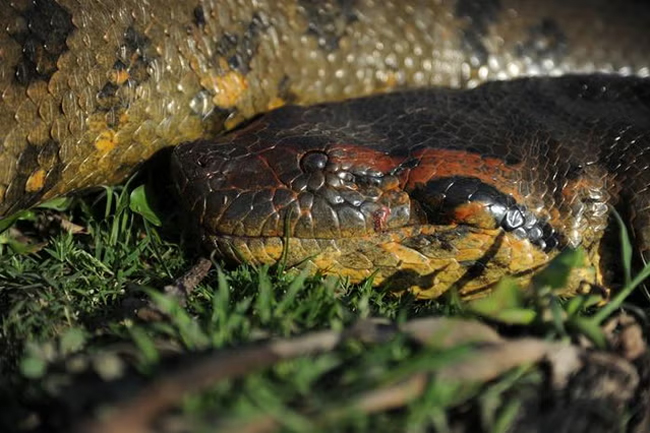World’s largest snake: New species of green anaconda discovered in Amazon
February 23, 2024 01:59 pm
Scientists have discovered a previously undocumented species of giant anaconda in the Amazon which they say can grow up to 7.5m and weighing close to 500kg, making it the largest and heaviest snake yet known in the world.
Until now, four species of anacondas were known, with the largest one – the green anaconda – inhabiting tropical parts of South America such as the basins of the Amazon, Orinoco, and Esequibo rivers, as well as some smaller watersheds.
These anacondas, found in the rivers and wetlands of South America, are well known for their lightning speed and ability to squeeze the life out of prey by coiling around, asphyxiating them, and swallowing them whole.
A newly published decades-long study has now found that the green anaconda is genetically two different species.
Researchers working with the indigenous Waorani people captured and studied several specimens of the newly named northern green anaconda (Eunectes akayima) in the Bameno region of Baihuaeri Waorani Territory in the Ecuadorian Amazon.
The species was found during filming for National Geographic’s Disney+ series Pole to Pole with Will Smith.
Scientists documented several anacondas belonging to the new species “lurking in the shallows, lying in wait for prey” as they paddled canoes down the Amazonian river system.
“The size of these magnificent creatures was incredible – one female anaconda we encountered measured an astounding 6.3 metres long,” study co-author Bryan Fry from the University of Queensland said in a statement.”There are anecdotal reports from the Waorani people of other anacondas in the area measuring more than 7.5 metres long and weighing around 500 kilograms,” Dr Fry said.
The new species, described in the journal Diversity, diverged from the previously known southern green anaconda about 10 million years ago, differing genetically from it by 5.5 per cent.
To put this in perspective, humans differ from chimpanzees by only about 2 per cent.
The finding, according to researchers, is pivotal for the conservation of anacondas, which are apex predators and vital to maintaining balance in their ecosystems.
A healthy anaconda population means their ecosystems are vibrant with ample food resources and clean water, while declining numbers of the snake may indicate environmental distress, scientists say.
“So knowing which anaconda species exist, and monitoring their numbers, is crucial,” researchers write in The Conversation.
The anacondas and their habitats are under increasing threat from land fragmentation caused by industrialised agriculture, forest fire, drought, climate change, as well as heavy metal pollution linked to spills from oil extraction activities.
“Of particular urgency is research into how petrochemicals from oil spills are affecting the fertility and reproductive biology of these rare snakes,” Dr Fry said.
Source: The Independent
--Agencies












